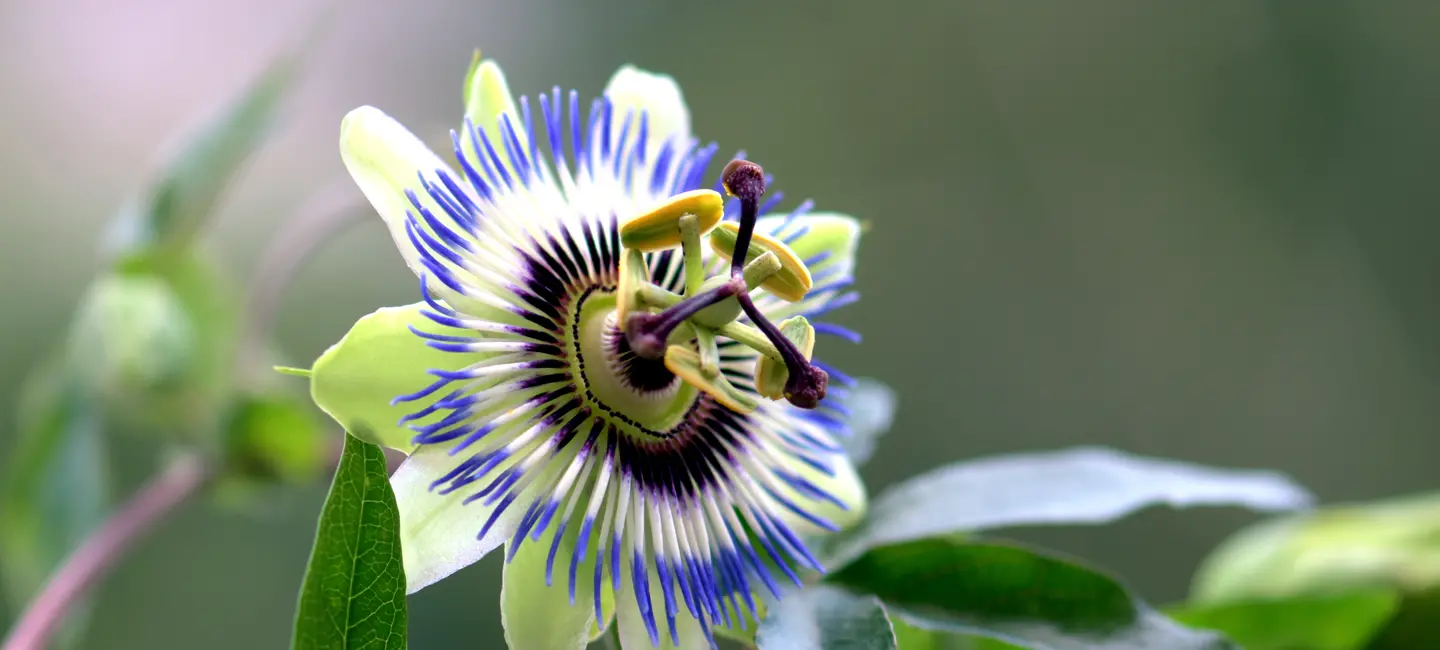
Passion flower (Passiflora incarnata) is a climbing vine with white and purple flowers. The chemicals in passion flower have calming effects.
Passion flower is native to the southeastern United States and Central and South America. It's been traditionally used to help with sleep.
People use passion flower for anxiety, including anxiety before surgery. Some people also take passion flower for insomnia, stress, ADHD, pain, and many other conditions. But there is no good scientific evidence to support these uses. In some foods and beverages, passion flower is added for flavoring.
Is It Effective?
NatMed Pro rates effectiveness based on scientific evidence according to the following scale: Effective, Likely Effective, Possibly Effective, Possibly Ineffective, Likely Ineffective, Ineffective, and Insufficient Evidence to Rate.
- Anxiety. Taking passion flower by mouth can reduce symptoms of anxiety. It might work as well as some prescription medications.
- Anxiety before a procedure. Taking passion flower by mouth can reduce anxiety when taken 30-90 minutes before surgery. In fact, it might work as well as some other treatments for anxiety before surgery, such as melatonin or midazolam. But it might also interact with some anesthesia drugs, so don't use passion flower before surgery unless recommended by a healthcare provider.
There is interest in using passion flower for a number of other purposes, but there isn't enough reliable information to say whether it might be helpful.
Is it Safe?
When taken by mouth: Passion flower is likely safe for most people when used as a flavoring in foods. It's possibly safe when taken as a tea for 7 nights, or as a medicine for up to 8 weeks. It may cause side effects such as drowsiness, dizziness, and confusion.
When applied to the skin: There isn't enough reliable information to know if passion flower is safe or what the side effects might be.
Special Precautions & Warnings:
Pregnancy : Passion flower is possibly unsafe when taken by mouth during pregnancy. It might lead to early labor and other problems. There are some chemicals in the passion flower plant that might cause the uterus to contract. Don't use passion flower if you are pregnant.
Breast-feeding: There isn't enough reliable information to know if passion flower is safe to use when breast-feeding. Stay on the safe side and avoid use.
Children: Passion flower is possibly safe for most children when taken by mouth for short periods of time. A specific passion flower product (Pasipay by Iran Darouk Pharmaceutical Company) has been used safely in children aged 6-13 years for up to 8 weeks.
Surgery: Passion flower might slow down the nervous system. Anesthesia and other medications used before and after surgery can also slow down the nervous system. Taking them together might slow down the nervous system too much. Talk to your healthcare provider if you are taking passion flower within 2 weeks of a scheduled surgery.
Medications moved by pumps in cells (Organic Anion-Transporting Polypeptide Substrates)
Interaction Rating=Minor Be watchful with this combination.
Some medications are moved in and out of cells by pumps. Passion flower might change how these pumps work and change how much medication stays in the body. In some cases, this might change the effects and side effects of a medication.
Sedative medications (CNS depressants)
Interaction Rating=Moderate Be cautious with this combination.
Passion flower might cause sleepiness and slowed breathing. Some medications, called sedatives, can also cause sleepiness and slowed breathing. Taking passion flower with sedative medications might cause breathing problems and/or too much sleepiness.
Herbs and supplements with sedative properties: Passion flower might cause sleepiness and slowed breathing. Taking it along with other supplements with similar effects might cause too much sleepiness and/or slowed breathing in some people. Examples of supplements with this effect include hops, kava, L-tryptophan, melatonin, and valerian.
There are no known interactions with foods.
Passion flower extract products typically provide 250-900 mg per dose. But there isn't enough reliable information to know what an appropriate dose of passion flower might be. Keep in mind that natural products are not always necessarily safe and dosages can be important. Be sure to follow relevant directions on product labels and consult a healthcare professional before using.
Apricot Vine, Burucuya, Corona de Cristo, Fleischfarbene, Fleur de la Passion, Fleur de Passiflore, Flor de Passion, Granadilla, Grandilla, Grenadille, Madre Selva, Maracuja, Maracuya, Maypop, Maypop Passion Flower, Pasiflora, Pasionari, Pasionaria, Passiflora, Passiflora incarnata, Passiflorae Herba, Passiflore, Passiflore Aubépine, Passiflore Officinale, Passiflore Purpurine, Passiflore Rouge, Passiflorina, Passion Vine, Passionaria, Passionblume, Passionflower, Passionflower Herb, Passionsblomma, Passionsblumenkraut, Purple Passion Flower, Water Lemon, Wild Passion Flower.
Information on this website is for informational use only and is not intended to replace professional medical advice, diagnosis, or treatment. While evidence-based, it is not guaranteed to be error-free and is not intended to meet any particular user’s needs or requirements or to cover all possible uses, safety concerns, interactions, outcomes, or adverse effects. Always check with your doctor or other medical professional before making healthcare decisions (including taking any medication) and do not delay or disregard seeking medical advice or treatment based on any information displayed on this website.
© TRC Healthcare 2024. All rights reserved. Use and/or distribution is permitted only pursuant to a valid license or other permission from TRC Healthcare.
